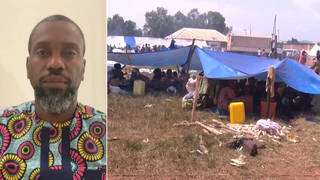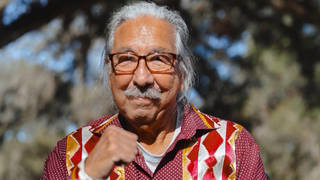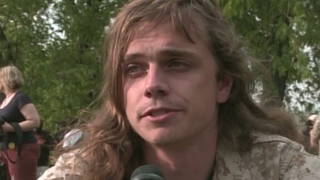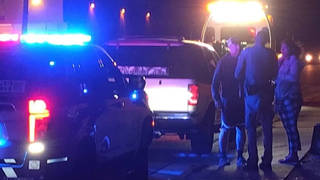
Related
Guests
- Scott OlsenMarine veteran who was critically wounded at an Occupy Oakland protest last year when he was shot in the head by a police projectile. He participated in Sundays veterans’ protest in Chicago, where he hurled his military medals toward the NATO summit.
We’re joined at the NATO summit in Chicago by Scott Olsen, who survived two tours in Iraq but almost died when he was hit with a police projectile at an Occupy Oakland protest last year. Olsen returned four of his medals at Sunday’s antiwar march. When asked why he’s joined the Occupy movement and is protesting against the heavily policed NATO summit, Olsen says, “I’m going to make every effort I can to show them that we’re doing the right thing, we’re in the right, and no matter what they do to any of us, we’ve got each other’s backs, and we’re going forward.” Click here to see the other parts of the 2013 Memorial Day Special: 1, 2, 4, 5.
Transcript
AMY GOODMAN: Back on the protest stage outside at the NATO summit, Lance Corporal Scott Olsen declared:
SCOTT OLSEN: My name is Scott Olsen. I have with me today—today I have with me my Global War on Terror Medal, Operation Iraqi Freedom Medal, National Defense Medal and Marine Corps Good Conduct Medal. These medals, once upon a time, made me feel good about what I was doing. They made me feel like I was doing the right thing. And I came back to reality, and I don’t want these anymore.
AMY GOODMAN: Like the riot police flanking the stage, many on horseback, Scott Olsen also wore a helmet. He’s recovering from a fractured skull after being shot in the head at close range by a bean bag projectile. He was not shot in Iraq, but by Oakland, California, police at Occupy Oakland last fall, where he was protesting.
SCOTT OLSEN: My name is Scott Olsen, and I came here to Chicago to return my medals to NATO and to be there for my other brothers and sisters
who went through the same thing as I did. And returning those medals, I think, was a big step for all of us to take, and it was a step that we all had to take together.
AMY GOODMAN: What medal did you return?
SCOTT OLSEN: I returned four medals. I returned the Global War on Terror Medal, the Operation Iraqi Freedom Medal, the National Defense Medal and the Marine Corps Good Conduct Medal.
AMY GOODMAN: That’s a lot of medals.
SCOTT OLSEN: Yes.
AMY GOODMAN: You served two tours of duty in Iraq?
SCOTT OLSEN: That’s correct.
AMY GOODMAN: When did you enlist, and when did you go to Iraq?
SCOTT OLSEN: I enlisted shortly after I graduated high school in 2005. And—
AMY GOODMAN: In Wisconsin?
SCOTT OLSEN: Yes. And in 2006, I went to Iraq for my first time, and we were extended to stay for the surge. And then I went again in 2008.
AMY GOODMAN: And what was your experience like?
SCOTT OLSEN: My experience in Iraq, you know, was really—it wasn’t right. Like, you know, I thought that we were over there doing good things and helping these people to have democracy and have a functional country, and at the same time protecting our country. But, you know, every day I spent over there, I found out that that wasn’t necessarily the case. I didn’t see us really doing any good work. We weren’t doing anything that we said we were going to do. And, you know, instead, we killed hundreds of thousands of civilians, and we tore their nation apart.
AMY GOODMAN: So when you came back after the second time, what did you decide to do?
SCOTT OLSEN: Well, I decided that I was—you know, there was no way I was going to reenlist. I wasn’t going to participate in the system anymore. And yeah.
AMY GOODMAN: And so, let’s talk about the second part of this journey, where you ended up at Occupy in Oakland.
SCOTT OLSEN: Yeah. After I got out, I found Iraq Veterans Against the War, and I started participating in actions with them and, you know, really making friends with other veterans who thought the same way as I did. So, I went up there to the Wisconsin protests last year, and that really radicalized me and made me see that—you know, the true power of being part of a community that’s trying to change things for the better. And I saw Occupy as the next step after that, as a continuance of that. And it’s something that I was waiting for and I think is something a lot of people were waiting for.
AMY GOODMAN: And so, what happened to you at Occupy?
SCOTT OLSEN: October 25th, I went to a protest in Oakland at night. And, you know, these people had just been removed from their encampment. And I thought that we had a right to be there. I thought that we had the right to have our voices heard there. So I went there, and a police officer shot me in the head with a bean bag round, and it fractured my skull.
AMY GOODMAN: Did you see the officer?
SCOTT OLSEN: I did not. It came out of nowhere. It came from my side. And, you know—
AMY GOODMAN: How do you know it was a bean bag?
SCOTT OLSEN: We had a test done, and the test results revealed that the pattern was consistent with what it would be if it were a bean bag round. So, that confirmed it.
AMY GOODMAN: And so, you ended up in the hospital. And how long were you in the hospital? And how long were you able—so you had a fractured skull.
SCOTT OLSEN: Right. So I went to the hospital. I was in the hospital for two-and-a-half weeks. I could not talk while I was in the hospital until the last few days, when I regained that—starting to be able to talk again. And I had neurosurgery and skull reconstruction surgery. So it was very, you know, hard to be in the hospital, and it was a lot to go through. But I’m really—I’m really glad that I really committed myself to getting better.
AMY GOODMAN: So, how did you go from Occupy Oakland, the hospital, rehab, to this NATO summit and willing to face whatever you would face here?
SCOTT OLSEN: Well, I’m really not going to let their actions stop me. And, you know, I’m not going to let that stop me and keep me home. I’m going to make every effort I can to show them that we’re doing the right thing, we’re in the right, and no matter what they do to any of us, we’ve got each other’s backs, and we’re going forward.
AMY GOODMAN: And to see the police and the riot police with their helmets, the police officers on horseback?
SCOTT OLSEN: I mean, that still always gets to me. I mean, they are always trying to intimidate us and, you know, keep our numbers down, keep families home. You know, people don’t want to bring out kids when there’s a threat of violence. So, that’s what that represents to me, and that’s why I was wearing my helmet today. You know, I can’t be too safe. You know, anything could happen. And, you know—
AMY GOODMAN: So you were wearing a black, shiny helmet.
SCOTT OLSEN: Right, I was wearing a helmet for my safety. And I have to do that every time I go out to a protest where there’s a threat of violence from the police.
AMY GOODMAN: Because?
SCOTT OLSEN: Well, because they have been using violence across the country, and they still do, and people are still getting hurt. And—
AMY GOODMAN: And if you get hit again in the head?
SCOTT OLSEN: Right. Like, since I had a recent brain injury, another hit would probably be deadly or cause much more damage, so I really can’t take that risk.
AMY GOODMAN: Lance Corporal Scott Olsen. After two tours of duty in Iraq, he came back to this country and served his country in a different way: He protested at Occupy Oakland. It was there that he was shot in the head by a police projectile, almost ending his life. He’s now recovering from a fractured skull. And he was one of more than 40 veterans who hurled their war medals at the NATO gates in Chicago. If you’d like a copy of today’s show, you can go to our website at democracynow.org. Back in a minute.












Media Options